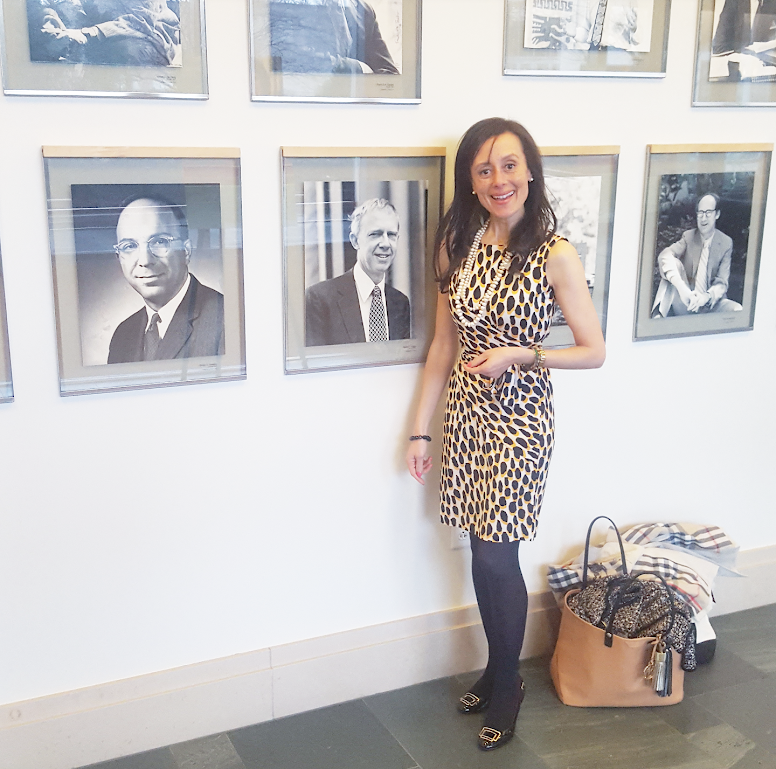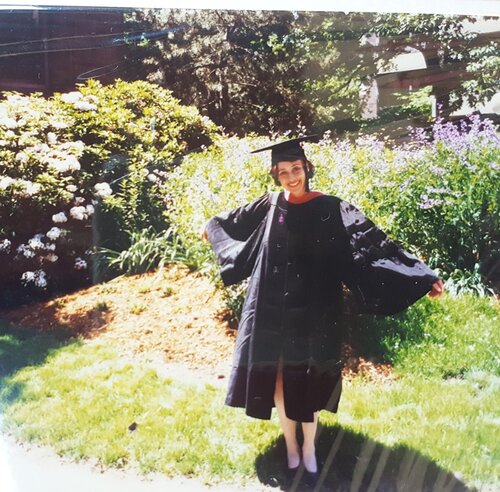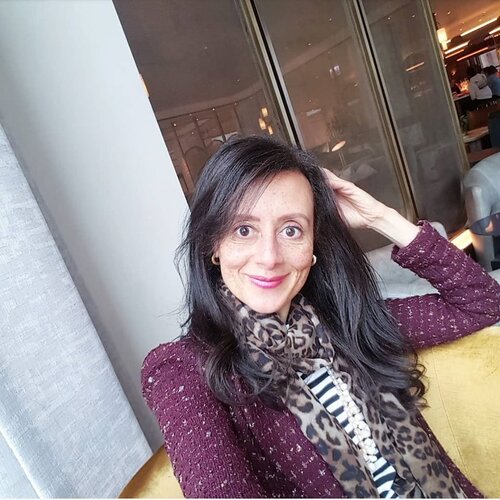Liberty will not long survive the total Extinction of Morals.
- Samuel Adams, Letter to John Scollay, April 30, 1776
Diary of My Disastrous Law Career: From Harvard to Heaven Help Me
Chapter 11
My interview for McGill University's "Lawfully Uncommon" blog about alternative careers for lawyers is live here, or scroll below. I'm delighted to be included in this series!



- Samuel Adams, Letter to John Scollay, April 30, 1776
Diary of My Disastrous Law Career: From Harvard to Heaven Help Me
Chapter 11
My interview for McGill University's "Lawfully Uncommon" blog about alternative careers for lawyers is live here, or scroll below. I'm delighted to be included in this series!
VALERIE BECK// FROM BIG LAW TO CHOCOLATE ENTREPRENEUR
Chocolate expert Valerie Beck is a pioneering entrepreneur in chocolate and hospitality. Valerie created the original Chicago Chocolate Tours, which she expanded to 4 cities across the US, grew to 50 employees, and ran for 10 years, educating and entertaining tens of thousands of people about the history, health benefits, production, and selection of first-class chocolate. Valerie's business currently brokers and distributes chocolate made by craft artisan chocolate makers, and provides consulting services to cacao growers and chocolate makers, always with a focus on ethical chocolate and sustainability.
A Chicago native, Valerie graduated from Harvard College and Harvard Law School. After practicing law in Europe and the US, she founded the chocolate tours and Chocolate Uplift, and is also a popular speaker, writer, chocolate show judge, and media personality. She started the Chocolate Freedom Project to end child slave labor on the cacao farms that produce cocoa beans for big chocolate brands, and supports formerly trafficked kids at a West African rescue center. She has also taught as an adjunct professor at Kendall College and UCLA Extension, spreading chocolate knowledge to new generations. Valerie’s mission is Uplift Through Chocolate, because chocolate can improve our mood and the world!

LET’S START WITH THE BASICS. WHAT ARE YOU DOING NOW? IN A SENTENCE OR SO, DESCRIBE YOUR WORK/PRACTICE(S).
I'm an entrepreneur and I love it! I started the first-ever chocolate tours and grew the business to 50 chocolate-loving team members in 4 cities; my current business, called Chocolate Uplift, distributes luxury bean-to-bar craft chocolate and I also do some consulting and speaking.
DID YOU ALWAYS IMAGINE YOURSELF GOING TO LAW SCHOOL?
Yes, though you could say it didn't really take imagination. I come from a family of lawyers and doctors, and was told growing up that I could be a lawyer or a doctor. I chose law because I thought it would be about justice, and would have less blood and nicer clothes; not only did this turn out to be untrue for me, but law simply didn't engage my skills or passions, or my imagination!
AT WHAT MOMENT DID YOU REALIZE YOU WANTED TO TAKE YOUR LEGAL EDUCATION AND CAREER IN YOUR OWN DIRECTION?
I knew in the first 10 minutes of law school that I was in the wrong place. I loved Harvard as an undergrad, yet Harvard Law School felt very different in those days; I was suddenly in a hostile and corporate environment rather than the welcoming and intellectual one that Harvard College had provided. I didn't have a Plan B, so I stayed in law school, and graduated, telling myself maybe I'd enjoy and be able to contribute in the practice of law. But, when I started working in a Big Law firm, I knew in the first 10 minutes that I was in the wrong place. We new hires took a personality test, the trainer had all of the NFs stand up, and the 5 of us who stood out of our group of 80 or so should probably have stayed on our feet and walked out then and there, because at least speaking for myself I was not cut out for the brutalities -- or the detail-focus and desk-bound nature -- of law firm work and life. I tell non-lawyers that my job as a corporate finance and m&a attorney was to make rich banks richer by writing hundreds of pages of contracts and fine print, while getting paid less than the male lawyers who were doing the same thing, and they groan and understand some of why I quit.
WHAT WERE THE STEPS YOU TOOK AND OPPORTUNITIES YOU SEIZED IN ORDER TO GET WHERE YOU ARE?
I stopped following other people's plans for me and started following my own heart. I was terribly depressed as a lawyer, and I asked myself what used to make me happy or still did. Chocolate! I thought back to an idea I'd had when I was 19, while studying abroad from Harvard at the Sorbonne, to start chocolate tours and help people fall in love with fine chocolate the way I was. There weren't any chocolate tours anywhere back then, just architecture tours mainly, and the idea to combine chocolate and tours stayed in my mind. Sometimes I feel that the idea chose me. Chocolate has made me happy my whole life -- not only eating it but learning about it -- and I decided to do something that made me and others happy. So I simply began: I gathered a group of friends, walked them around to my favorite chocolate shops where we met my friends who owned the stores and gave us samples, and I educated and entertained my group with stories from chocolate's global history and deep health benefits. That was the first Chicago Chocolate Tour.
WHAT MAKES YOUR CURRENT PRACTICE “LAWFULLY UNCOMMON”?
What a great phrase! I once heard someone say that entrepreneurship is the only place where you can be yourself and not be fired, and that really resonated! I also love that as a business owner, I can create the kind of positive and egalitarian culture I never had when working at law firms. For example, I did something radical when I started my first business: I paid men and women the same. That didn't happen at the law firm. Even today, in many countries, firms, and companies, equal pay is lawfully uncommon, isn't it.
IS THERE ANYONE INFLUENTIAL IN YOUR LIFE THAT HELPED YOU REALIZE YOUR GOALS? MENTORS OR ROLE MODELS IN THE FIELD THAT INSPIRED YOU?
I looked to people in history who followed their hearts to help others while fulfilling their own destinies: Gandhi, King, Jane Addams of Hull House. I looked to women entrepreneurs who did things their own way, authentically, and pulled others up with them: Mary Kay Ash. And I found that I met people in business who were more collaborative than competitive, a refreshing change from my law experience. Also: my mom and sister were super supportive! They'd seen how sad I'd become as a lawyer, and wanted me to be happy again.

WHAT GOT YOUR JUICES FLOWING OR TICKLED YOUR FANCY WHILE AT LAW SCHOOL?
Some of my classmates were and are deeply kind and brilliant people with whom I'm still friends today. Last month I celebrated a milestone birthday with two of them! I also loved being a research assistant for (the now late) Professor Detlev Vagts (I'm posing next to a photo of him at the Law School in one of the attached photos), because he worked on fascinating international and historical projects, and was gentle and ethical, a humble superstar. He needed someone who spoke French and German plus English; there I was.
WHAT MADE YOUR BLOOD BOIL OR MADE YOU SNOOZE WHILE AT LAW SCHOOL?
The misogyny I experienced at that time, from classmates, professors, and administration, was extremely upsetting to me. Again, I love Harvard, and I go to my Harvard College reunions and am an active alumni association member, but I found Harvard Law at that time, in the 1990s, hard to love. For example, my torts class was about bad things that happened to women: death from IUD birth control, wrongful births from defective birth control, death from other products and services. My criminal law class was about bad things that happened to women: rape, murder, getting prosecuted for abandoning their children. The wife of my torts professor, who was herself a law professor at another university, was murdered during my first year of law school, and the case remains unsolved today. The male students on the Law Review parodied her murder and career in the annual parody issue. A group of female students posted the male students' names and future Big Law jobs and Supreme Court clerkships. The dean punished the female students who spoke out about the parody, and did not punish the male students who created the parody. After I started practicing law, the misogyny and hostility of law school seemed like it had been a warm-up for law firm life. On a positive note, when now-Supreme Court Justice Elena Kagan became dean, after I graduated, I understand that the environment changed significantly, and I applaud and support the Law School's efforts toward inclusion of women, Blacks, and other underrepresented groups, as well as the expansion of opportunities beyond the corporate choices we were generally funneled toward back in the 90s.
WERE THERE CHALLENGES YOU FACED IN THE TRANSITION FROM LAW SCHOOL TO THE PROFESSION?
Almost everything about law school and the profession were a challenge. The transition itself wasn't very stark: from misogyny to misogyny.
DO YOU STILL SEE THE LAW ALL AROUND YOU?

Interesting question. I'll give a lawyerly answer: yes and no. Yes in that the law itself undergirds much of our society and the business world, and knowledge of law is beneficial in business. I became an adjunct professor alongside my business at one point, teaching Business Law to college students who were majoring in entrepreneurship, hospitality, or culinary arts. It was fun to make law relevant and fun for them, in a way it hadn't been for me. No in that I see chocolate all around me, and big-picture possibilities, and I work with people who don't have a legalistic mindset but are more focused on issues of sustainability and social justice through other methodologies. For instance, one of my clients is another woman entrepreneur who has started a chocolate-making business in her native El Salvador, using locally grown cacao to make sophisticated chocolate that we have brought into the US market. Delicious! I'm also involved in activism work to end child slave labor on bulk cacao farms that supply all the big chocolate brands you see on grocery store shelves, and in the chocolate that goes into the desserts at many restaurants, hotels, schools, and institutions. Child slave labor and products made therefrom are illegal and unethical; without enforcement of the law, we find additional ways to drive change, such as through educating the public and creating ethical supply chains.
WHAT ADVICE WOULD YOU GIVE TO A FIRST-YEAR LAW STUDENT?
Run. Run fast, run far. If law is simply something you think is a good way to make a living, or you've seen a TV series like Suits and believed it to be in any way an authentic representation of the practice law, turn on your critical thinking; research the reality before you commit. Or, if law truly is your passion, and you have a specific field you care about or way in which you want to make a difference (and you're not an NF), go for it! Either way, I hope you have no debt, and I hope you have a Plan B, or cultivate other interests, as many lawyers leave the law at some point, or the law leaves you. Truly, be true to you, and all is well.
IF YOU WERE GIVEN THE BLESSING AND CURSE OF AN EXTRA HOUR EVERY DAY TO DO WHATEVER YOU WANTED, WHAT WOULD IT BE?
Another interesting question! Reading more books, eating more chocolate, or learning more languages are all tempting answers, as is learning a martial art which I have always wanted to do, but I will say I would spend that extra time on reflection, because over the years I have found increased value in taking time to do less and be more.
ANY REGRETS?
No. Regrets come from not doing your best, whatever your best is at that moment. Plus, education and experience are never wasted!
More information on Valerie can be found here:
Short and long bios are also here.

Comments
Post a Comment
Join the discussion...